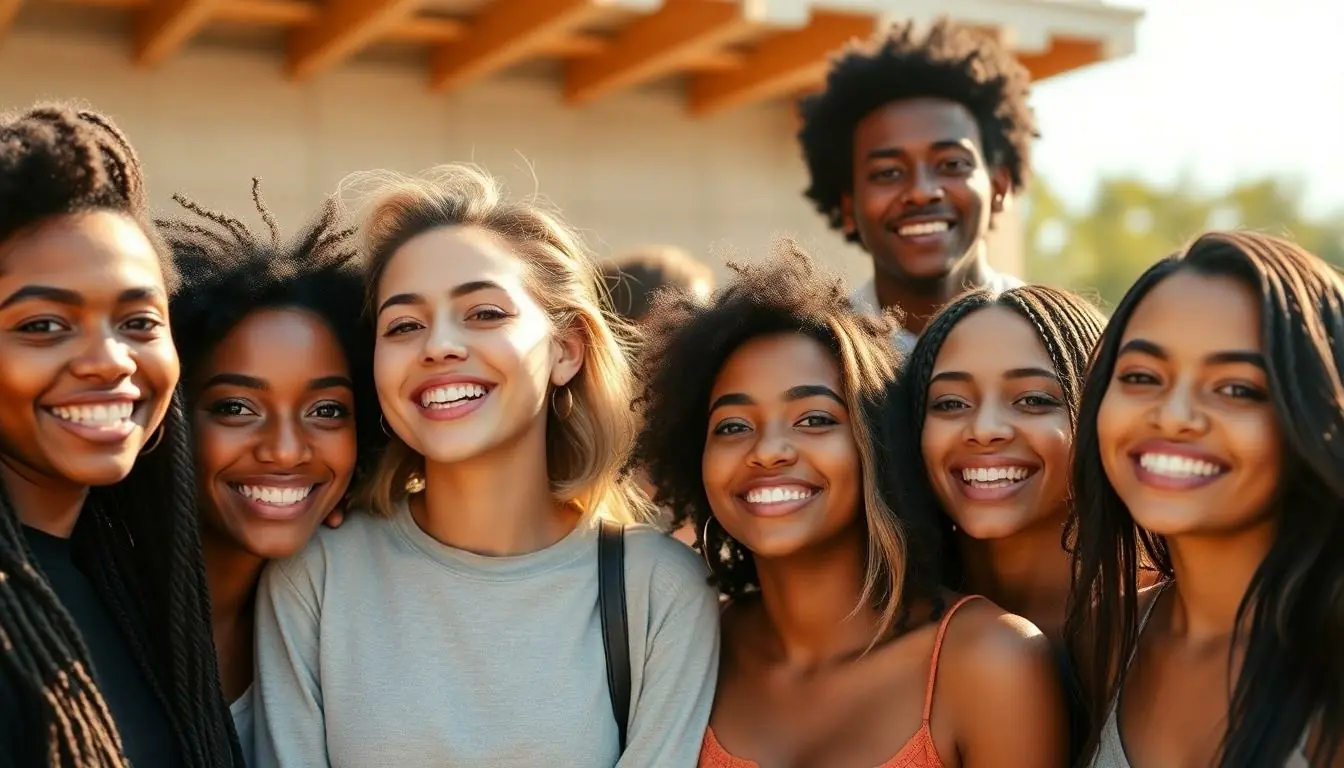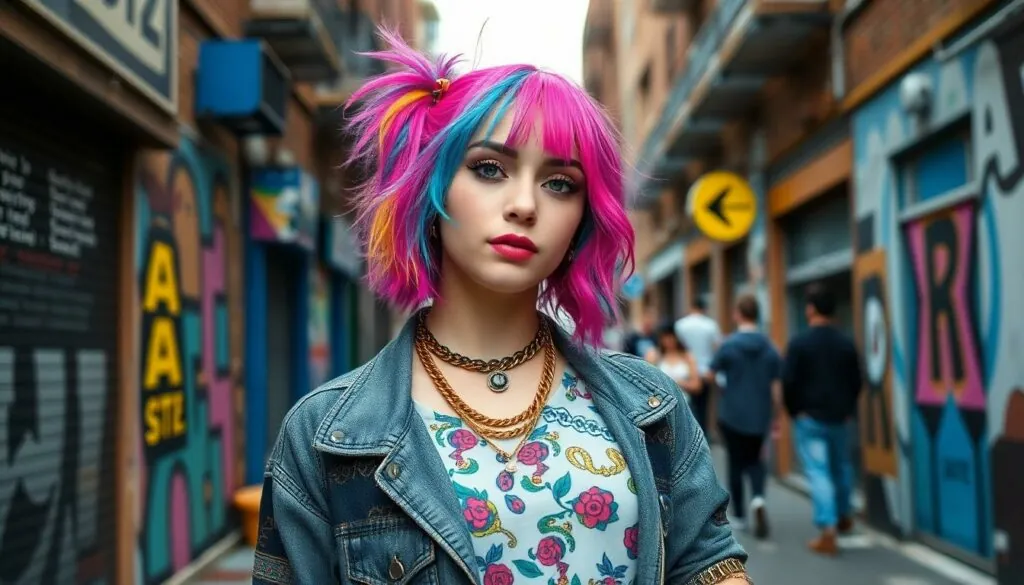Gen Z is taking the beauty world by storm, and they’re not just following trends—they’re redefining them. With a keen eye for authenticity and a flair for creativity, this generation embraces a fresh approach to beauty that’s as diverse as their TikTok feeds. Forget the cookie-cutter looks of the past; it’s all about self-expression and breaking the mold.
Table of Contents
ToggleOverview of Gen Z Beauty Trends
Generation Z is reshaping the beauty landscape with a strong emphasis on authenticity. Valuing genuine representation, they uplift diverse voices and embrace various beauty standards. Their preference for creativity often translates into unique makeup looks and bold fashion statements, showcasing an individualistic approach.
Social media platforms, especially TikTok, play a pivotal role in driving these trends. TikTok’s viral challenges and tutorials influence Gen Z’s beauty choices. Quick, engaging video content inspires trends like the “clean girl” aesthetic, minimalist makeup, and skinimalism, which prioritizes skincare over heavy makeup.
Additionally, sustainability remains a significant focus. Many Gen Z consumers favor eco-friendly brands that align with their values. Brands are adopting environmentally responsible practices to capture this audience’s attention.
Inclusivity further defines Gen Z’s beauty preferences. They demand products that cater to a wide range of skin tones and conditions. This demand promotes companies to expand their product lines, ultimately enhancing representation in beauty.
Transparency in branding also resonates with this generation. They seek out brands that openly communicate their ingredients and ethical practices. Trustworthiness becomes a critical factor when selecting beauty products.
Emerging trends, such as DIY beauty hacks, highlight Gen Z’s resourcefulness. Many young individuals experiment with homemade masks and remedies, reflecting a return to natural, uncomplicated beauty routines. This trend signifies a desire for personalized and unique self-care experiences.
By focusing on authenticity, sustainability, inclusivity, and transparency, Gen Z continues to revolutionize the beauty industry. Their dynamic approach influences product development and marketing strategies, ensuring that the beauty landscape evolves alongside their values and preferences.
Emerging Beauty Standards

Generation Z champions a new era of beauty standards, emphasizing authenticity and diversity. These emerging trends signify a shift away from traditional norms, showcasing Gen Z’s unique perspectives.
Inclusivity and Diversity
Inclusivity drives Gen Z’s beauty preferences. They demand products that cater to various skin tones, ensuring representation across the spectrum. Brands now recognize the importance of diverse marketing campaigns. This generation seeks genuine representation in advertising as well as product offerings. Many companies find success when they embrace and celebrate varied cultural backgrounds. Heightened awareness of inclusivity fosters stronger connections with consumers, establishing brand loyalty. Social media serves as a powerful platform for showcasing those diverse voices, amplifying the demand for change in the industry.
Natural Beauty Aesthetics
Natural beauty aesthetics resonate strongly with Gen Z. Many young people prefer minimal makeup looks that enhance their features rather than conceal them. Skinimalism has become a defining trend, prioritizing skincare over heavy makeup routines. Fewer products often result in a fresher and more authentic appearance. Focus on natural ingredients in beauty products also reflects greater awareness of health and well-being. The rise of DIY beauty hacks further emphasizes this trend, allowing individuals to personalize their beauty routines. Gen Z embraces a holistic approach to beauty that combines self-care with minimalism, fostering a movement rooted in authenticity.
Popular Products and Brands
Generation Z drives the beauty market with specific product preferences and brand loyalties. They emphasize skincare and innovative makeup items that reflect their values.
Skincare Revolution
Skincare dominates the Gen Z beauty routine. Brands like The Ordinary and CeraVe offer effective products at accessible price points. Affordable options attract Gen Z consumers, featuring ingredients like hyaluronic acid and niacinamide. Clean and minimal formulations resonate with this demographic, prioritizing health over makeup. Companies that emphasize sustainability, like Biossance, align with their eco-conscious ideals. The rise of multi-functional products, such as serums that hydrate and treat, showcases their demand for efficiency. Brands responding to this trend are enhancing transparency and ingredient sourcing.
Innovative Makeup Items
Makeup trends showcase unique products captivating Gen Z. Brands such as Fenty Beauty and Glossier embrace diversity, offering foundations for an extensive range of skin tones. Popular items include lightweight, buildable foundations and tinted moisturizers that promote natural beauty. Bold, vibrant colors appeal to self-expression through makeup, empowering users to experiment. Eco-friendly packaging, seen with brands like Ilia and Milk Makeup, attracts sustainability-focused consumers. Face and eyelid glosses gain popularity, adding versatility and shine. Generational preferences lean toward products that promote individuality while prioritizing skin health.
Social Media Influence
Social media significantly shapes Gen Z’s beauty preferences, with platforms defining current trends and challenges.
Platforms Shaping Trends
TikTok, Instagram, and YouTube drive beauty innovation, showcasing new products and techniques. Users on TikTok share short, engaging videos that demonstrate unique styles and approaches to beauty. Instagram’s visually rich environment encourages aesthetic experimentation through photos and stories. YouTube offers in-depth tutorials, creating space for influencers to showcase popular makeup routines. Together, these platforms promote diverse voices, ensuring representation across various demographics. The rapid exchange of ideas fosters a sense of community, with users supporting and reshaping beauty narratives.
Viral Challenges and Trends
Viral challenges emerge quickly on social media, captivating Gen Z’s attention and participation. The “clean girl” aesthetic gained momentum, promoting minimal makeup and natural beauty. Skinimalism challenges encourage users to simplify their makeup routines, focusing on skincare rather than heavy coverage. Other trends, like faux freckles and abstract eye looks, invite creativity and self-expression among beauty enthusiasts. These challenges often foster a sense of belonging, as participants share their interpretations and accomplishments within their online communities. Adapting to these trends, brands launch products targeting specific challenges, further aligning with Gen Z’s values and preferences.
Sustainability in Beauty
Generation Z champions sustainability, pushing for eco-friendly practices within the beauty industry. This demographic actively supports brands that prioritize environmental responsibility and sustainable sourcing.
Eco-Friendly Brands
Eco-friendly brands attract Gen Z consumers with their commitment to sustainability. Fenty Beauty and Biossance represent two examples of brands leading the charge. Fenty Beauty emphasizes inclusivity while adopting sustainable practices, offering recyclable packaging. Biossance, known for its clean ingredients, uses renewable resources to create effective skin care products. Many Gen Z individuals seek transparency in sourcing and production methods, ensuring they align with brands that mirror their values. With an increasing focus on sustainability, these eco-conscious brands carve out a significant market niche among young consumers.
Conscious Consumerism
Conscious consumerism defines Gen Z’s approach to purchasing beauty products. They consider the environmental impact of their choices, favoring brands with ethical practices. Many young shoppers are drawn to companies that actively reduce waste and implement sustainable packaging initiatives. Furthermore, they often conduct research into a brand’s practices before committing to purchases. Several studies indicate that 73% of Gen Z buyers prefer to support brands that align with their values. Ultimately, conscious consumerism empowers this generation to drive change in the beauty industry, reshaping market dynamics through informed purchasing choices.
Generation Z’s impact on the beauty industry is undeniable. Their commitment to authenticity and inclusivity is reshaping how brands approach product development and marketing strategies. With a strong focus on sustainability and diverse representation, this generation is pushing for a beauty landscape that reflects their values.
Social media continues to play a crucial role in driving trends and fostering creativity among young consumers. As they embrace natural beauty and innovative self-care routines, brands must adapt to meet their evolving preferences. The future of beauty lies in understanding and celebrating the unique perspectives of Gen Z, ensuring that the industry remains vibrant and inclusive for all.





